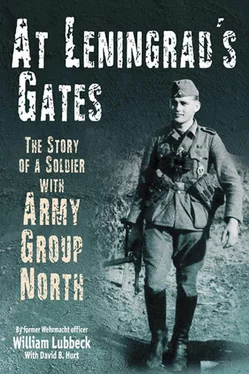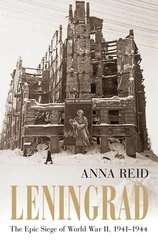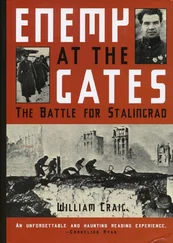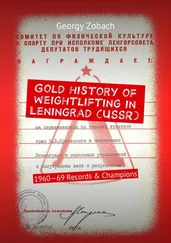Perhaps a mile from Fischhausen, a group of ten soldiers from my company appeared on the north side of the road, huddled just outside the entrance to one of the immense 60-by-100-foot earth-camouflaged bunkers. Among them was Senior Sergeant (Hauptfeldwebel) Jüchter, the head of the Tross (rear area); a couple of other sergeants (Feldwebels); two lance corporals (Obergefreiten); and several privates (Schützen).
“Where are the rest?” I asked in a somber voice. One of the men quietly replied, “We were attacked with bombs, rockets, and artillery fire. We lost our horses. We lost our equipment. We lost everything. It is all ruined. We are the only ones left.” Anyone else who may have survived the assault had disappeared in the ensuing confusion or had simply fled west.
There was little further conversation. The events of the preceding hours and weeks had left us traumatized and exhausted. With the end in sight, a bleak mood filled the bunker. The men only wanted basic information and direction. They looked to me to provide it, but I knew no more than they did. For the first time in the war, I was on my own with no orders where to go and no idea what to expect.
In urgent need of new orders, I told my men that I would seek to locate the commander of our 154th Infantry Regiment, Lieutenant Colonel (Oberstleutnant) Ebeling as soon as my vision cleared. By the time one of the men had finished wiping my eyes and removing bullet splinters from my face an hour later, I could see well enough to commence a search.
Ordering my men to remain at the bunker, I set out into the woods on the narrow neck of land farther west. Shells continued to rain down intermittently, but did little to hamper my reconnoitering of the area. Fifteen minutes later, I came upon a small camouflaged bunker about 25 yards south of the main road. When I stepped inside, I anticipated nothing but another vacant chamber.
To my astonishment, the bunker instead held half a dozen senior German generals, easily identifiable by the red stripes that ran down the side of their pants. Left momentarily speechless, I reflexively came to attention and saluted. Gathered around a table studying maps, they failed to show any surprise at my abrupt appearance and simply returned my salute.
Just as I was about to request new orders, the sudden drone of planes outside ended the awkward moment. As the generals scrambled under the table inside, I ducked back outside the entrance. From the south, a formation of about a dozen American-made B-25 bombers marked with Soviet red stars had already begun to dive toward our area. Still 3,000 feet up, a steady stream of small black objects began tumbling out from beneath the aircraft. There were only seconds to take cover before their bombs commenced plastering the ground where I stood.
Sprinting twenty feet from the bunker, I leapt into a long, six-foot-deep trench. If you seek shelter in a bunker that takes a hit and collapses, you are doomed. If you can take cover in a foxhole or a trench, however, a shell or bomb must land almost directly on your position to cause death or serious injury. You might suffer a concussion if a shell or bomb impacts nearby, but you will live.
Crouching down in the trench, I kept my head just below the surface to avoid the risk of being buried. With my hands cupped loosely over my ears, I opened my mouth. This allowed the air pressure inside my head to match that of the atmosphere. If an explosion occurred nearby, it would prevent my eardrums from blowing out. Combat teaches a soldier many tricks of survival, if you live long enough to learn the lessons.
At the same moment that I gained cover, the Russian bombs began detonating around my position in rapid succession, almost like a salvo of giant rockets. A succession of deafening blasts shook the earth and convulsed the air with indescribable violence. In that instant, I wondered whether my luck had finally run out and it might be the end for me. Strangely, perhaps, I experienced no sense of terror. Shelling, rocketing, and bombing had become such a routine part of my existence in the preceding years that I had almost grown accustomed to them.
As the bombs pulverized my surroundings, there was nothing for me to do but wait it out. My mind became a numb void as an animal instinct to survive took over. Even with my mouth opened to equalize the pressure, an explosion perhaps six feet away generated such concussive force that it nearly blew my eardrum out.
When the minute-long rain of bombs finally ceased, I knew that I was fortunate to have survived once again. With my ears ringing and my mind dazed, I unsteadily climbed out of the trench. Despite minor wounds, lack of sleep, and inadequate food during the preceding weeks of combat, I was still in fair shape physically. My psychological state was more battered, but I had to try to remain clear-headed. As an officer, it was my duty to lead and take care of my men.
Though the generals’ bunker was still intact, I decided that they had greater concerns than providing orders to a company commander. Renewing my search for my regimental commander, I headed back in a northerly direction and recrossed the main road.
Perhaps ten minutes later, I unexpectedly found Lt. Col. Ebeling attempting to establish a new defensive line a quarter of a mile away. Relieved, I could now finally find out what was going on and obtain new orders.
In a short conversation, he informed me that the high command was sending us back to Germany. All the surviving officers from our 58th Infantry Division were to return there to serve as the nucleus for a new division that the army planned to create in Hamburg. Meanwhile, the few remaining enlisted men in our division would be transferred to the still intact 32nd Infantry Division, which would remain behind as a rearguard to slow the Red Army’s advance.
After explaining the directive, Ebeling wrote out and signed the order in my small Soldbuch (military record book). Since the officers of our division would be traveling on their own to increase the likelihood that some would reach Germany, these written orders would prevent the SS (Schutzstaffeln) from punishing me as a deserter if I was stopped. A stroke of the pen had opened the door for me to escape death or capture by the Russians.
Grateful for the chance to escape the mounting chaos, it was nonetheless apparent that accomplishing such a journey would be almost impossible. Already, the Red Army had cut off the overland route back to Germany farther west beyond the Frische Isthmus, a long, narrow strip of sand that ran along the coast of the Baltic Sea. At the same time, ships attempting to reach Germany over the Baltic faced great risk of Soviet attack.
When I reached my remaining soldiers waiting at the bunker, I pulled aside Senior Sgt. Jüchter and explained that I had been directed to return to Germany with one soldier from my company. As my second in command, Jüchter was the natural choice to assist me in building a new unit, but I felt it was important to allow him to make his own decision rather than issue an order. “Will you go with me?” I inquired. With a simple “Jawohl” he assented.
While our own prospects for reaching central Germany appeared doubtful, Jüchter and I would at least be given a chance to try. Aware that such information would only compound their sense of hopelessness, I did not divulge my own orders as I informed the other men of their imminent reassignment to the 32nd Division.
With almost all of my company lost, it was anguishing for me to leave these few men behind. In the two days that remained at the ammunition bunker, I sought to oversee the successful transfer of these surviving troops in my company to their new unit. Meanwhile, Jüchter attempted to use his connections with the rear echelon of our regiment to obtain medals that several of them were due.
Читать дальше












